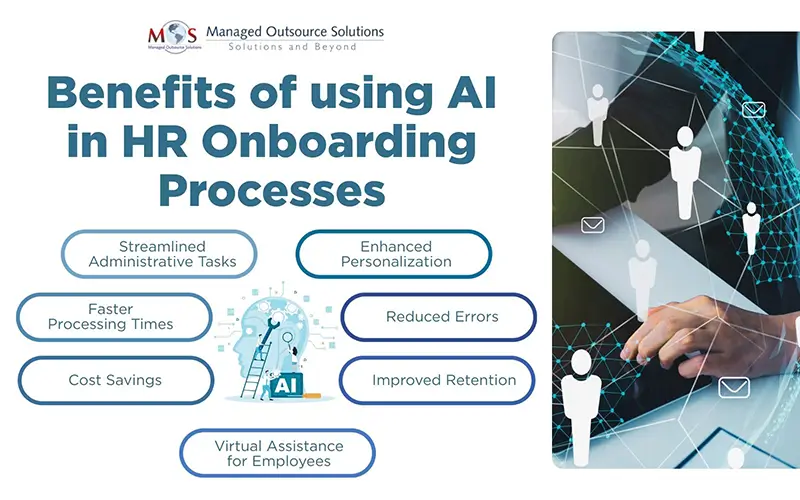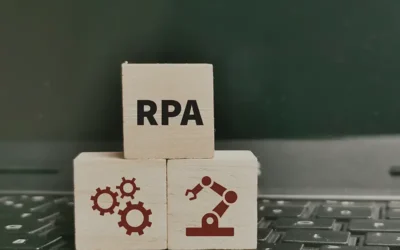Today, AI makes a big difference in the daily operations of a business. With AI in HR onboarding and Robotic Process Automation (RPA), companies are experiencing a profound shift in how they add new talent. The onboarding process is one of the most important stages in an employee’s journey with an organization. A smooth transition from candidate to team member sets the right platform for productivity, satisfaction, and retention. Traditional onboarding practices often involve repetitive paperwork, manual data entry, and lengthy processes that can overwhelm both HR professionals and new hires. The use of Artificial intelligence solutions is not just streamlining HR operations – it is redefining them. From faster documentation to personalized training programs, AI is enhancing efficiency, accuracy, and engagement. In this post, we will explore how AI in employee onboarding is transforming human resources and why it is becoming an essential tool for organizations embracing digital transformation in HR.
What Is Employee Onboarding?
In simple terms, employee onboarding is the process of welcoming new hires into an organization and equipping them with the knowledge, skills, and resources they need to succeed. A well-structured onboarding process includes training and familiarizing employees with the company culture. Following such an approach helps new employees to feel valued, prepared, and connected. That way you create a seamless onboarding experience that enhances employee satisfaction and engagement.
What is AI-powered Employee Onboarding?
Imagine a new hire joining your company with enthusiasm, only to feel overwhelmed, disconnected, and unsupported within just a few weeks. This is a common challenge, especially for organizations with limited resources or remote teams. Research shows that a strong onboarding process plays a critical role in employee retention. Yet, many businesses still struggle with inefficiencies, inconsistent training, and a lack of personalized support. This is where AI-driven onboarding solutions make a difference.
But what does AI-powered employee onboarding really mean? In simple terms, it leverages generative artificial intelligence (AI) to streamline and automate the onboarding journey, creating a more engaging, efficient, and personalized experience for every new employee.
The Role of AI in Modern HR Onboarding
The integration of AI in modern HR onboarding has brought new levels of speed and precision to HR departments. Traditionally, onboarding involved multiple manual tasks, such as verifying documents, scheduling training, and answering repetitive questions. These tasks consumed valuable time and were prone to human error. AI automates many of these processes, allowing HR professionals to focus on strategic initiatives rather than administrative work. For instance, AI chatbots can answer common employee questions, while RPA can process forms and update systems in real-time. The result is a highly efficient onboarding process that reduces delays and boosts the new hire experience.
How AI is Transforming Employee Onboarding in HR
Organizations that have embraced AI in employee onboarding report significant improvements in efficiency, employee satisfaction, and long-term retention. Users report how AI has ushered in a remarkable transformation in their organizational processes. Some key benefits of using AI in HR onboarding processes include:
- Streamlined administrative tasks: Instead of spending hours verifying employment details, collecting personal documents, and entering data manually, your team could focus on what matters the most – supporting new hires. AI-enabled employee onboarding automates onboarding manual processes by managing employment verification, document collection, and data entry. These systems ensure that everything happens accurately, reducing errors and saving valuable time for HR staff.
- Enhanced personalization: Personalization plays a crucial role in the AI journey for employees by ensuring that every new hire feels valued and supported by tailoring their experience to their unique needs. AI onboarding tools analyze the new hires profiles, skills and career goals to create customized training paths. For instance, a technical employee might receive hands-on modules, while a new manager might be guided toward leadership programs. AI can even deliver employee multilingual onboarding materials to support diverse teams.
- Faster processing times: Onboarding often involves numerous forms, compliance documents, IT setup requests, and background checks. Traditionally, HR staff had to manage these tasks manually, which caused delays and sometimes slowed down an employee’s start date. With RPA (Robotic Process Automation) and AI-powered workflows, repetitive administrative steps can be completed in minutes. For instance, once an offer is accepted, AI can automatically generate employment contracts, update HR systems, and trigger IT requests for email and system access. This ensures new hires are ready for work much faster, improving both efficiency and first impressions.
- Reduced errors: Manual onboarding processes are prone to mistakes – such as errors in employee data, misplaced documents, or missed compliance steps. Even small errors can cause legal issues, payroll delays, or a poor employee experience. AI significantly reduces these risks by automating data entry and cross-checking information across multiple systems. For instance, if an employee’s address is entered incorrectly, the AI system can detect inconsistencies and identify them before submission. This ensures accuracy, minimizes compliance risks, and builds trust with new hires.
- Cost Savings: Onboarding can be resource-intensive, requiring HR staff, trainers, and managers to spend hours guiding new employees. These hidden costs add up, especially for organizations with high hiring volumes. AI reduces these expenses by automating routine tasks and streamlining workflows.
- Improved Retention: One of the most significant benefits of AI in HR onboarding is its impact on employee retention. A poorly managed onboarding process can leave new hires disconnected from the organization – often leading to early resignations. AI combats this issue by providing personalized support and predictive insights. Analytics tools can monitor employee engagement during onboarding and identify warning signs, such as low training completion rates or delayed system logins. This targeted approach helps employees feel more connected, reducing turnover and increasing long-term loyalty.
- Virtual Assistance for Employees: AI-powered chatbots act as virtual HR assistants, answering common questions about policies, benefits, or IT setup. This provides employees with instant access to information, minimizing frustration and increasing engagement.
Recent Statistics on AI in HR Onboarding
- According to a 2024 survey by Deloitte, 72% of organizations that implemented AI in their HR processes reported a 30% reduction in onboarding time.
- A 2025 report by Gartner found that companies using AI-driven onboarding solutions saw a 25% increase in employee retention rates within the first year.
- Research by McKinsey in 2024 indicated that AI-powered onboarding tools can reduce administrative costs by up to 40%, allowing HR teams to focus more on strategic initiatives.
Challenges in AI Onboarding
Now that we have seen how AI is transforming employee onboarding in HR, the next consideration is how to address the challenges when adopting AI in HR onboarding:
- Data Privacy: Protecting sensitive employee data is essential. Companies must comply with privacy regulations like GDPR.
- Employee Adaptation: Not all employees may be comfortable interacting with AI tools. Training and support are critical.
- Integration with Legacy Systems: Ensuring that AI solutions work seamlessly with existing HR systems can be complex.
By carefully planning and implementing AI tools, HR leaders can overcome these obstacles and unlock the full potential of digital onboarding.
The integration of AI in HR onboarding is no longer a hi-tech concept. Rather, it is a present-day reality transforming how companies welcome new employees. Through RPA, AI-driven personalization, and predictive analytics, HR teams can create onboarding experiences that are efficient, engaging, and personalized to individual needs.
By embracing digital transformation in HR, organizations can enjoy the benefits of using AI in HR onboarding processes, from reduced costs to higher retention. Ultimately, AI in employee onboarding is more than just a tool – it is a strategic advantage that ensures new hires feel supported and ready to succeed.
Explore the power of AI in HR onboarding and create a smarter, more engaging onboarding journey.





